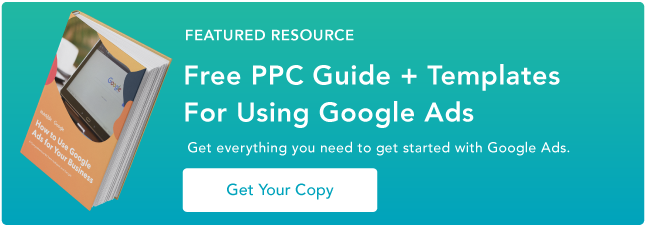If you're a PPC veteran, it's tempting to devote all your time to the bigger picture and finding creative new ways to drive cheap, conversion-friendly clicks.

This is especially true for ecommerce businesses, which are playing in an incredibly complex and competitive space, particularly when using PPC.
Even small businesses are getting on the pay-per-click bandwagon. According to a 2018 study, 45% of businesses under 50 employees invest in PPC. That number jumps to 74% when it comes to small businesses with 50 employees or more.
Because of the complexity and constant competition, it's quite common to overlook some of your low-hanging fruit.
Why is PPC so important to ecommerce businesses?
Unsurprisingly, online product searches -- especially on Google -- are booming. More and more ecommerce businesses are taking notice and buying into PPC. In Q4 of 2018, spend on Google Shopping ads rose by 43%.
Although Amazon is still the first stop for many customers' product searches, Google isn't far behind. According to Wordstream, the average customer buys a product within 20 days of searching it on Google and with 26 days of searching it on Amazon. They also report that 35% of users purchase a product within 5 days of the Google search.
Below is a list of five tips that ecommerce marketers can use to gain an edge on competition without overspending.
Ecommerce PPC
1. Balance out broad and ultra-specific keywords.
Imagine you sell tires and rims for a living. You just opened a location on the same street as a number of different auto dealerships. (I know, you're an ecommerce marketer, but stay with me here).
You see customers walking in every day that are still in research mode and have no idea what brand they want or which size tire they even need.
You find that many of those walking into your store tend to talk with your employees for advice and end up leaving with you in mind, but clearly look elsewhere for better prices now that they're more informed.
Now let's say you came across a number of customers who knew exactly which tires they needed down to the specific model number.
These customers who are much further down the sales cycle are much more likely to purchase from you if they walk in your store first.
There is a very similar scenario being played out in the ecommerce space for those bidding on competitive terms. In this industry, for example, those might be, "cheap tires" or "tire deals online."
Users may click on 4 to 5 different ads, use your site to do some research, and then purchase from whoever has the lowest price.
While you may never escape the vicious cycle of paying for expensive clicks on the more general and competitive keywords, you can begin to balance it out by targeting the specific end of the spectrum. To do this, you might try keywords like model numbers, part names, or UPC codes.
You'll rarely see the same volume of users typing in queries with this level of granularity. But there are plenty of potential customers out there who know exactly what they want and just need to figure out the easiest way to get it.
Not only are the clicks significantly cheaper due to the low competition on model number keywords, but the conversion rates are much higher. This will help bring your overall CPA down.
Additionally, when someone clicks on your model number ad, you can send them directly to a product page which gives them everything they were looking for in one place.
2. Identify and expand on long-tail keywords.
There might also be customers who know a lot about what they're looking for, but aren't quite typing in a UPC code just yet. They likely be typing in long-tail keywords like, "red capri pants in petite," or "Red Sox bleacher seats."
In the Google Ads interface, take a peek in your Search Query Report. (If you're having trouble finding it, look within a campaign under "Keyword Details.") This report will show the exact searched keywords and phrases that triggered your ads.
Sort by the keywords that have resulted in conversions and try to identify long-tail keywords which may contain a few specific product details.
For example, imagine you're bidding on the term "new rims" but learn that someone purchased a product on your site after searching the brand, size, and color of rims they wanted. Here, you could add that long-tail keyword to the appropriate ad group and bid on it aggressively since you know it converts well.
Think of your broad keywords as casting a wide net. They will catch a great deal of fish. But, in order to find gems, you'll need to analyze data to see which keywords actually converted, and identify long-tail keywords that you're missing.
3. Bid on keywords similar to your competitors'.
Now that you've covered those users searching for specific products, why leave out those searching to buy specifically from your competition? Plenty of searches come from those who've heard about a specific brand to buy from -- but they're not convinced yet. These searchers might be open to other options with better offers.
In the physical shopping world, someone might walk into a competitor's store next door to yours if they have signs boasting better prices and bigger selections. This is why it can be helpful to create campaigns targeted to competitor keywords with simple ads making customers aware that you're also an alternative, affordable option.
4. Don't use a competitor's branded keywords.
While targeted a competitor's ad keywords, you should avoid targeting branded keywords. A few things might happen if you do this:
- You'll be paying for less qualified traffic.
- When your competitor notices, they may drive up your costs dramatically by bidding just a little bit more themselves (because they have a higher quality score).
- Your competitors could complain to Google and you'll get a slap on the wrist (or worse).
- You'll look like a poor sport, or even a bit of a jerk.
None of those are too appealing. Instead of directly targeting branded keywords, take cues from your competitors' PPC ads to help inform your own strategy.
For example, if a competitor is bidding on keywords that are important for your business, you might consider getting a paid presence for those terms, too.
Or, on the flip side, a couple competitors are winning organically for keywords that are important to you, but it's going to take you months to edge them out. In the interim, using PPC to win some traffic for those terms is a great stopgap.
5. Include transparent pricing in your ads.
With the limited amount of characters we can use in text ads and the rising cost per click, it's become increasingly important to qualify your traffic before your ad is actually clicked on.
Even when you target certain keywords, there's only so much you can infer from a person who types in general terms. You can't ask them how serious of a buyer they are, whether they're still in research mode, or what their level of intent is.
However, you can screen out less qualified people by simply putting pricing information in your ads. If you let someone who is only willing to spend $40 on a product know beforehand that all your products are $75 and above, chances are they won't click on your ad.
This saves your ad spend for those qualified leads who saw your prices, know what to expect, might not be scared away by price, and are much more likely to convert into a sale.
When it comes to optimizing PPC, this advice is just the tip of the iceberg. If you need further help planning out your next campaign, use this guided template to drill even further down on keywords, landing pages, and AdGroups.











